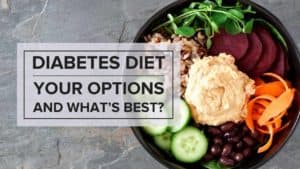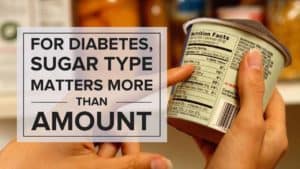
Can Diabetics Eat Fruit?
The simple answer? Yes, and they should! People with type 1 and type 2 diabetes often hear a common misconception that they shouldn’t eat fruit.
Since people with diabetes often struggle with managing their blood glucose levels (blood sugar levels), it would seem logical to avoid the high natural carbohydrate content of fruits in favor of low carb options.
However, fruits do not worsen your risk of type 1 or type 2 diabetes, and are actually proven to be a valuable part of an overall diet that decreases your risk of insulin resistance, and can actually help reverse the underlying causes of prediabetes and type 2 diabetes.
In this article, we’ll explain the real causes of prediabetes and type 2 diabetes, the specific cases where you should be smart around your fruit intake, and the overwhelming body of evidence supporting the addition of fruit to your diet, irrespective of your diabetes status.
The Main Risk of Diabetes Complications: Insulin Resistance
The complications of prediabetes and type 2 diabetes (and many of the complications of type 1 diabetes) originate from an underlying condition called insulin resistance.
Insulin resistance results from the accumulation of excess dietary fat in cells that are not designed to store large quantities of fat, which in turn inhibits the action of insulin.
Insulin resistance in your liver and muscle inhibits glucose uptake from your blood to both tissues, resulting in high blood glucose (hyperglycemia).
So while a high blood glucose is responsible for the complications of diabetes, it is not the underlying cause. Insulin resistance is.
And if you reverse insulin resistance (by reducing dietary fat, not dietary carbohydrates), you can reverse diabetes complications.
So Are the Carbs in Fruit Bad for You?
No, they’re not. The natural carbohydrates in fruit are long-chain carbohydrates that come prepackaged with fiber and micronutrients, which take a long time to digest and absorb, providing a steady uptake of glucose into tissues.
These natural carbohydrates are often confused with added sugars like fructose and artificial sweeteners, when in reality they’re very different. Since these artificial sweeteners lack the high nutrient and fiber content, they’re broken down quickly and absorbed directly into your blood.
This is what can spike your blood glucose (blood sugar levels), and prevent a dangerous risk to people with type 1 and type 2 diabetes, which is why experts like the American Diabetes Association recommend avoiding added sugars completely.
Now, fruits packed with grams and grams of carbohydrate can spike your blood glucose just like any other high-nutrient food, so if you’re having a very hard time controlling your blood glucose we recommend plants like leafy greens instead.
However, in the long term, these fruits can be the foundation of a high-energy, easily manageable diabetes diet, and include numerous health benefits that we’ll touch on below.
Health Benefits of Fruit for Type 2 Diabetes

For those living with a very high degree of insulin resistance, some fruits can make it challenging to stay in range after a fruit-based meal.
But as you adapt to a higher percentage of fruits (along with other plants and whole foods), these natural sources of sugars can be the foundation of diet with low long-term health risks, easy-to-control blood glucose, and numerous beneficial nutrients.
Unsure of your level of insulin resistance? Take our 60-second quiz now.
Lower Risk of Complications
In most cases, fruits are something you can eat ad libitum, or as much as you want with no risk of long term chronic diseases. In fact, the research shows that they improve your long term health, including as a method of diabetes management and weight loss treatment for obesity.
These results have been proven time and time again, and have also been shown to reduce your risk for a number of different conditions.
This isn’t true for meats and processed foods, which can increase your risk for heart disease, kidney disease, high blood pressure, cancer, and all cause mortality.
More Predictable Blood Glucose (Blood Sugar) Levels
As we mentioned above, fruits provide a steady and consistent source of energy that your liver, muscles, and brain process over a longer period of time than added sugars.
In the long run, this makes it easier to manage your blood glucose and maintain a good time in range, because the increase and decreases will happen over a longer, more steady period of time.
Rich Source of Nutrients
All of these health benefits are without even getting into the specific nutrient values of different fruits. Obviously, every fruit is different, from the super-powerful amla berry to less nutrient-dense fruits like watermelon.
However, most fruits have a few things in common:
Glycemic Index of Fruits
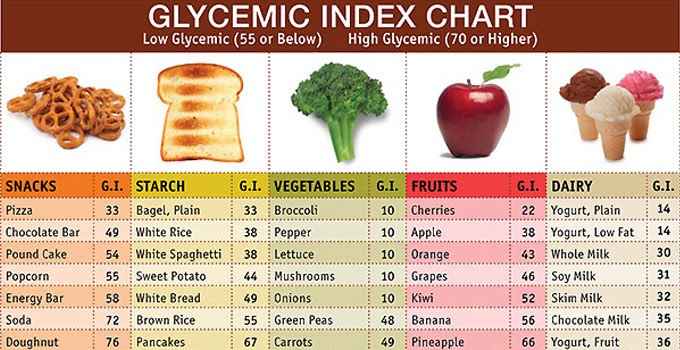
Caption: Image provided by www.goqii.com
Another slightly misunderstood reference that turns some people away from fruit is the glycemic index, which measures the ‘glycemic load’ of a food, or how much it will raise your blood glucose levels after eating it.
The glycemic index is a good indication of how energy-dense foods are which can be helpful in planning out your pre or post meal insulin, but they’re not a perfect system for planning out healthy eating.
For example, fruits that are high in carbohydrates, whole grain foods, and starchy vegetables tend to be higher on the glycemic index, however they don’t spike your blood glucose if you eat them in combination with other fiber-rich foods, allowing you to eat them in abundance as part of a very healthy, low risk diet.
On the other hand, sodas, added sugars, and processed foods have a higher glycemic index, but can be absolutely disastrous for your long term health.
In essence, the glycemic index is a great tool for understanding your blood glucose and staying in range, but it shouldn’t dictate your entire dietary strategy.
Best Fruits for Diabetics
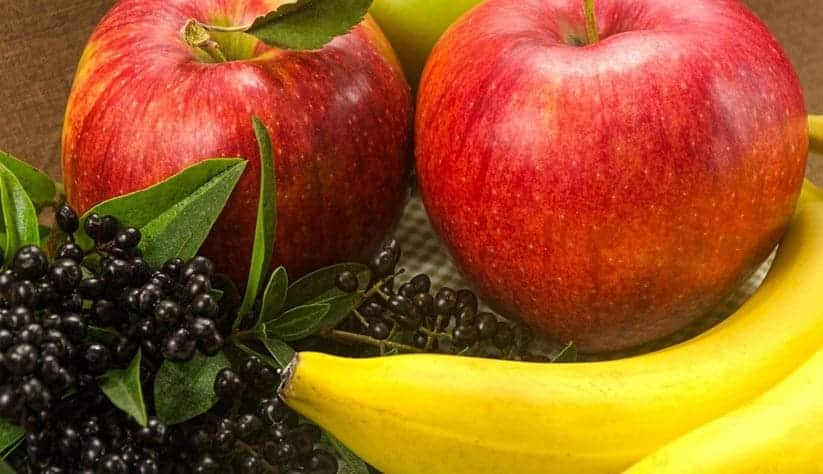
Our recommendations for fruits are pretty simple. As long as they’re natural, whole foods, eat them as much as you want, in as large quantities as you want. Whole fruit, fresh fruits, high-fiber fruits like apples and bananas, blackberries, grapefruit, kiwi, cherries, dragon fruit — whatever you like!
In the long, term you’ll see the difference.
Now, if you have severe insulin resistance or struggle with fluctuating blood glucose, we recommend earning your ability to eat fruits high on the glycemic index by eating a diet containing as much low glycemic plant material as possible for a few weeks first.
Once you have gained a significant amount of insulin sensitivity, then begin increasing your intake of higher glycemic fruits and your blood glucose is unlikely to spike in the post-meal state.
For a full list of our recommendations, you can check one of our many lists of the best fruits for people with diabetes!
Worst Fruits for Diabetics
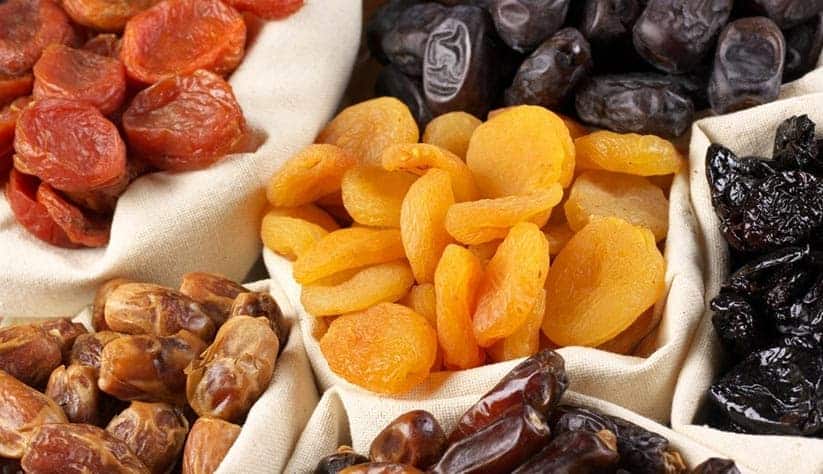
This is a bit of a misnomer, since the problem for people with diabetes isn’t the fruits themselves (even watermelon, the antithesis of the low GI strategy). Instead, the problem is what is added to some fruits.
Some things are advertised as fruits, but are actually full of processed sugars and chemicals, and we recommend avoiding these whenever possible. For example, be wary of:
In any serving size, these foods tend to be closer to candies than whole foods, and run counter to the health benefits of fruit in the first place!
Diabetes Diet and Fruit: The Bottom Line

For almost everyone, fruit is an incredibly healthy food that can be the foundation of any meal plan, whether you’re looking simply to reach/maintain a healthy weight or aiming for a more comprehensive strategy of diabetes management.
However, if you’re currently having a hard time keeping your blood glucose in a healthy range, it may be a good idea to work with your doctor and a registered dietitian.
This way, you can get a good idea of how many grams of carbs and servings of fruit to integrate into your diet as you work towards reversing insulin resistance.
If you’d like to learn more about how to use fruit, as well as a low-fat, plant-based, whole-food diet to manage and potentially reverse diabetes, explore our Weekly Meal Plan. You’ll discover how to eat a wide variety of dishes containing delicious fruit while keeping your blood glucose in range as much as possible.
Stop Guessing What to Eat
Get Delicious Recipes Sent to Your Inbox Every Week!
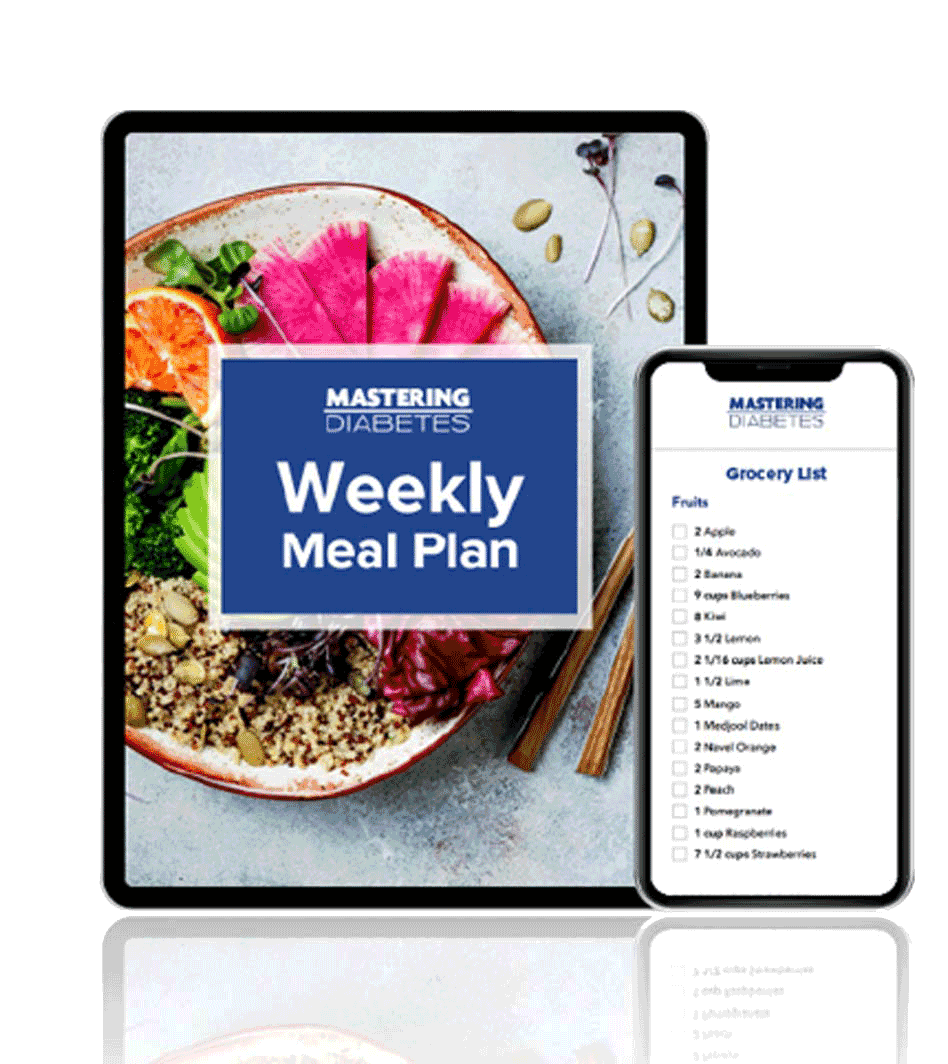
Discover the custom-designed Weekly Meal Plan that gives you clarity on what to eat and how to shop to simplify your journey to lower blood sugar, weight loss, and your best A1c


